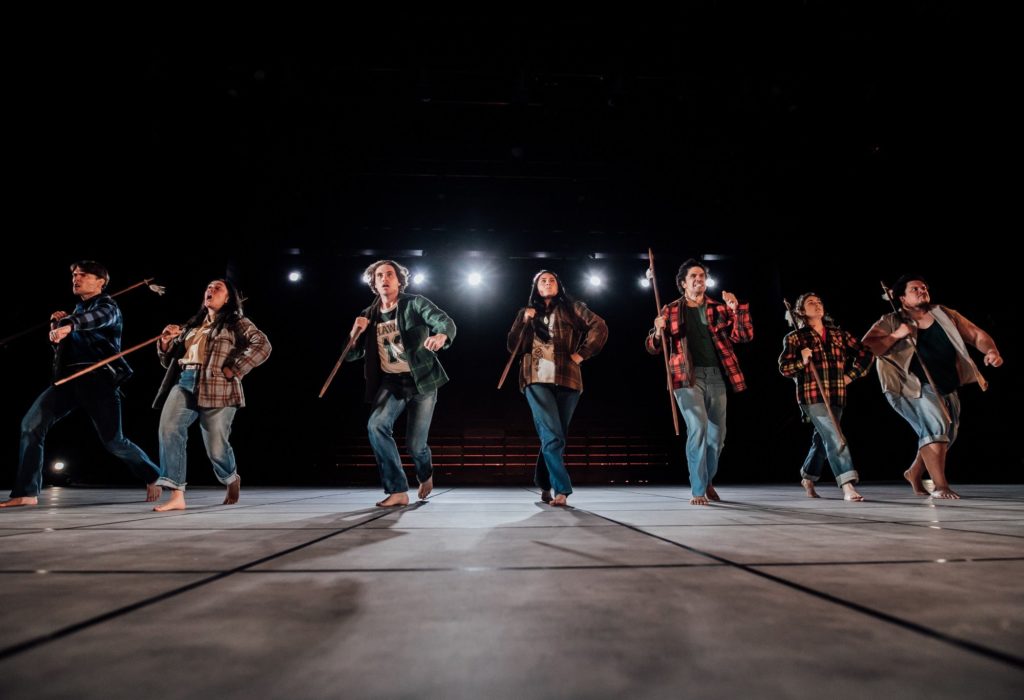Theatre is at it’s best when it uses both humour and dramatic moments to challenge our preconceptions. Auckland Theatre Company’s latest production The Haka Party Incident does just that.
Beginning with a soulful karanga and a haka this play tells the story of a brief moment in 1979 when Māori students at the University of Auckland challenged a capping tradition called the The Haka Party. This ‘party’ was initiated in the 1950s and involved engineering students donning grass skirts and performing a derogatory version of a haka in public parades and various locations around inner city Auckland. Despite complaints by Māori over many years, neither the engineering students nor university authorities agreed to stop it. The play explores the protest and its aftermath.
It is a cleverly constructed drama that uses real dialogue from recorded interviews with the actual participants which creates a virtual documentary on the stage.
Writer and director Katie Wolfe has gone to great lengths to ensure that every stutter, every hesitance, every ‘um’ and ‘ah’ from the original interviews is recreated on stage.
By doing so, the dialogue has a legitimacy that is visceral and compelling and that enables the audience to believe they are actually observing history in the making.
The cast in this production is remarkable. Each of them plays multiple characters and there are times when a single actor morphs into a different personality mid speech. These changes happen seamlessly and with such skilful and subtle alterations in posture and voice that watching it happen is never confusing.
For the first half hour the Māori and Pākehā students tell their versions of what happened. It is interesting and at times very funny. While the Māori students explain their hurt and anger at the mockery of their culture, the engineers come across in their introspection as ignorant and amusingly inept with their cringeworthy reenactment of the haka and mangling of Māori words.
It is a strong reminder that, while to us in the present, this is embarrassing and unacceptable, back in 1979 it was pretty standard behaviour and reflective of the attitude of many Pākehā to the indigenous people and their culture.
As the story continues, it gets darker. We witness police brutality, not with literal physical action, but through the words of those who experienced it. Simply staged, it is agonising to listen to and filled me with deep anger.
But, shortly afterwards, the play turns lighter and there is more humour. It continues to weave like this through the rest of the story. Sometimes heavy, sometimes funny – a clever way to carry an audience along. The lighter moments acting as breathing spaces, allowing us to contemplate what we are watching and gain insight from it.
The Haka Party Incident is aheartfelt expression of hurt, anger, and injustice but also a call for understanding and healing. Many times during it, we hear Māori voices repeating the refrain that they are never listened to, never heard. This play gives voice to that frustration, and makes us pay attention.
What becomes abundantly clear though is that tangata whenua are calling not for retribution but for reconciliation. As one character says, acknowledging biculturalism leads to multiculturalism. In other words, healing the relationship between Māori and Pākehā will enable all cultures to exist peacefully in our country.
There is a moment towards the end of the play when the actors are chanting and advancing down stage while the words “Acknowledge the Past” and then “Walk boldly into the future,” are projected on the back wall of the stage.
Those simple yet elegant words from a Māori proverb sum up why The Haka Party Incident is a story all New Zealanders should see. It is a work that beautifully and courageously illuminates the dark side of racism and colonialism in Aotearoa/New Zealand while also proffering a way to move forward together.
THE HAKA PARTY INCIDENT by Katie Wolfe
Presented by Auckland Theatre Company and Auckland Arts Festival
ASB Waterfront Theatre
30 March – 10 April 2021
Tickets and info www.atc.co.nz 0800 282 849
